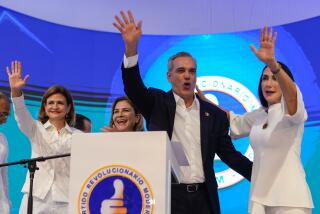Ruling Party Retains Power in Antigua Vote
- Share via
ST. JOHN'S, Antigua — When the polls closed and the counting began in this Caribbean nation’s bitterly fought general elections Tuesday night, the opposition candidates followed what has become a tradition in their decades-long pursuit of power:
They all went into hiding.
But when the final tallies were in Wednesday morning in this country long awash in mysteries unsolved and charges unproved, they all were safe. They’d lost--again.
The long-ruling Bird dynasty remained intact. And the opposition’s oft-stated fears of ruling party reprisals had once again proved unfounded.
In fact, in announcing results Wednesday that gave his long-ruling Antigua Labor Party 12 of the 17 seats in Antigua and Barbuda’s House of Representatives, Prime Minister Lester Bird called for reconciliation in this deeply divided twin-island nation.
Bird, whose family has controlled the levers of local power here for all but five of the last 50 years, said he had withstood the most “intense” and “vociferous” challenge to his party’s rule in a quarter of a century.
The charismatic 62-year-old, clad in a red golf shirt, also vowed in his televised statement “to heal the wounds in our country” after an election campaign marked by opposition charges of massive government corruption, dire warnings of emergency rule and allegations by both parties that the other had, in a bid for votes, sown discord by playing native Antiguans against the thousands of foreigners who live here.
“Now is the time of peace,” Bird said in reciting from the biblical passage giving each time its season.
“I would want to think there is some degree of sincerity there,” Baldwin Spencer, the Oxford-educated leader of the opposition United Progressive Party, responded in an interview after emerging from his safe house Wednesday morning.
Spencer, 50, who won his parliamentary seat along with four other opposition members--down from a total of six--said he was shocked by the results. His party members said the ruling party bought the election through lavish campaign spending and vote-buying--charges that Bird denied.
There were numerous reports of election-day irregularities, many the result of an outdated, 24-year-old voter registration list. Several registered voters who were turned away at the polls told The Times that they had filed complaints that impostors had voted for them or for their relatives who were living abroad or dead.
But Spencer indicated that he and his party will accept the election results, despite the flaws.
“We are prepared to play our part as an effective opposition,” he said. “I don’t think the election was completely free nor completely fair, but, on balance, I believe the people had the opportunity to make their choice.”
Yet in a nation where past elections have been characterized by critics and political analysts here and abroad as unfair and corrupted in the ruling party’s favor, the opposition leader stopped short of declaring Tuesday’s vote a democratic advance.
“The United Progressive Party had sought to take the moral high ground in the campaign and stress those issues we felt were important in the moral course of the nation,” Spencer said. “And it was a tough sell when you’re dealing with a society that has been politically immoral for so long.”
Bird’s government has won high marks from foreign investors for favoring rapid development with minimal government oversight, which the opposition charges has invited corruption and damaged the environment.
Bird, who had campaigned hard on economic issues under the slogan, “None better than Lester,” cast the election and its outcome as vital to the nation’s survival.
In doing so, he and his party framed the difficulties facing most of the world’s small states as they move into the globalized economy of the 21st century. Having lost Cold War-era foreign aid that helped drive their economies, island nations such as Antigua have become dependent upon the fragile and competitive tourism industry, offshore banking and banana exports supported by preferential trade agreements in Europe.
The Clinton administration has targeted those agreements as violations of free trade, recently announcing that it will punish the European nations with U.S. tariffs on their luxury exports.
In response, Antigua joined other Caribbean nations last week in suspending counter-narcotics treaties with the U.S. that permit American patrols, searches and seizures in their territorial waters.
As he voted Tuesday, Bird, whose traditionally pro-U.S. government recently was criticized in a State Department report as lax in combating drug-money laundering here, called the U.S. policy on the banana issue “reprehensible.”
More to Read
Sign up for Essential California
The most important California stories and recommendations in your inbox every morning.
You may occasionally receive promotional content from the Los Angeles Times.













